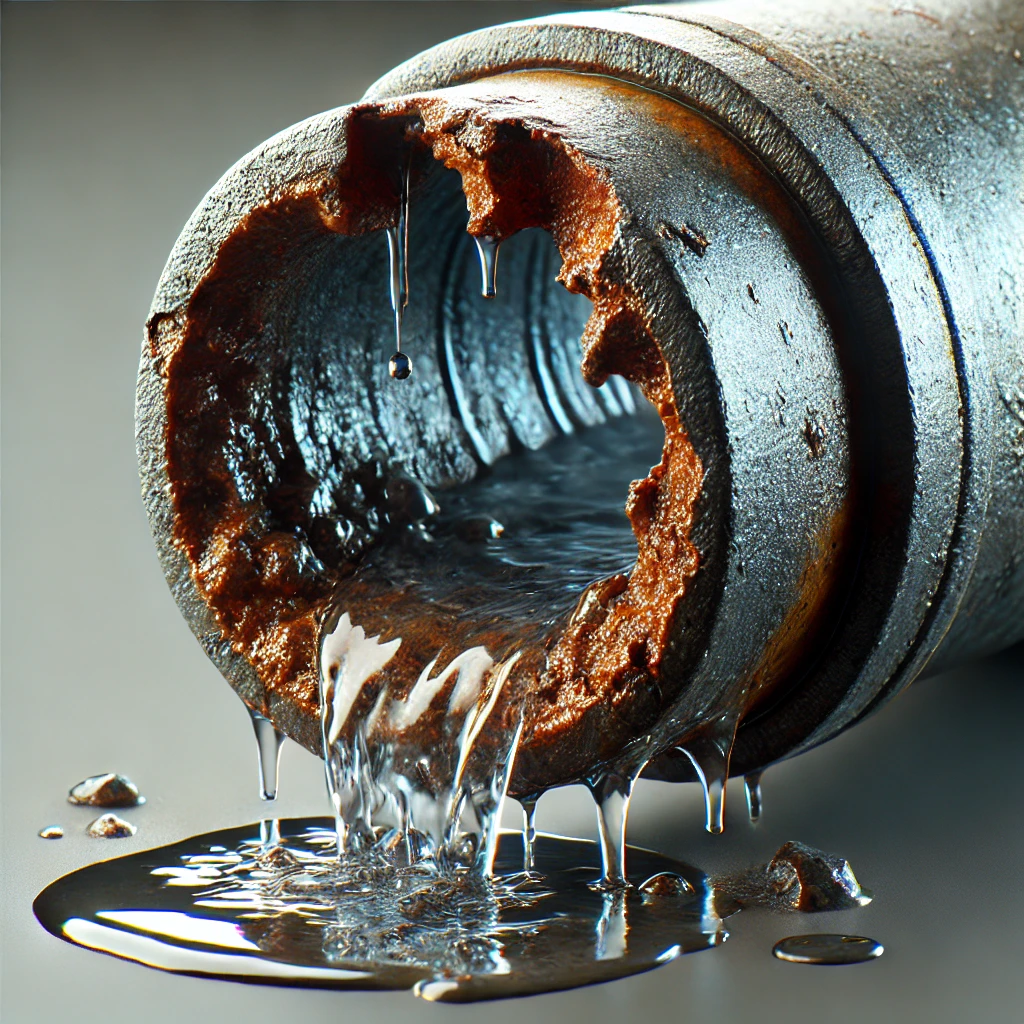
Cast iron pipes were once a popular choice for plumbing systems due to their durability and fire resistance. Installed in many homes from the early 1900s through the mid-1970s, cast iron piping was initially expected to last for up to 50 years or more. However, many homeowners with these older plumbing systems are now discovering that cast iron pipes are prone to slab leaks—a serious issue that requires immediate attention.
In this blog, we’ll explore why cast iron pipes are susceptible to slab leaks and why addressing the problem early can save homeowners from costly repairs and extensive property damage.
1. The Corrosive Nature of Cast Iron
- Cast iron pipes are made from a durable, heavy material that resists heat well, but they are highly susceptible to corrosion. Over time, the inner walls of cast iron pipes start to degrade due to exposure to water and the natural minerals and chemicals within it. This corrosion causes the pipe walls to weaken, creating tiny cracks that can eventually expand into full-blown leaks.
2. Wear and Tear Over Time
- Cast iron piping was often expected to last several decades, but environmental factors such as water quality, soil acidity, and moisture content in the ground can impact the lifespan of these pipes. The weight of the soil and concrete surrounding cast iron pipes adds extra stress, causing deterioration more quickly than in open-air conditions. Eventually, these pipes develop hairline fractures or pinholes that lead to leaks under the foundation.
3. Soil Shifts and Foundation Movement
- Cast iron pipes are installed beneath a home’s foundation slab, making them vulnerable to soil shifting and natural ground movement. Changes in soil moisture, temperature fluctuations, and nearby construction activity can all put pressure on cast iron pipes. Unlike modern materials that have some flexibility, cast iron is rigid and may crack under pressure, allowing water to leak into the surrounding soil.
4. Buildup of Minerals and Debris
- Cast iron pipes are prone to mineral buildup and debris accumulation. As water flows through the pipes, it deposits minerals that stick to the inner walls of the pipe. Over time, this creates rough, narrow passageways, which can lead to blockages and slow drainage. The pressure that builds up behind these blockages may eventually lead to cracks, causing leaks under the slab.
5. High Levels of Moisture and Rust
- Cast iron is naturally susceptible to rust when exposed to moisture for extended periods. The rusting process weakens the pipe and creates porous areas that allow water to escape. Additionally, rust particles can accumulate within the pipes, leading to clogs and reduced water flow. This combination of internal rust and blockage increases the likelihood of leaks forming, often leading to the slab leaks found in many older homes.
6. Signs of Slab Leaks Due to Cast Iron Pipes
If your home has cast iron pipes, you should be on the lookout for signs of slab leaks, including:
- Higher-than-normal water bills
- Damp spots or warm areas on your floors
- Moldy or musty odors
- Visible cracks in walls or flooring
- Low water pressure
- Unusual sounds of running water when no taps are on
Why Addressing Slab Leaks Is Critical
Ignoring a slab leak can have serious consequences. Left unaddressed, slab leaks can cause soil erosion beneath your foundation, leading to foundation cracks and structural instability. Water leaking into your home can damage flooring, walls, and cabinetry. Additionally, prolonged moisture exposure can lead to mold growth, which poses health risks and requires costly remediation.
What to Do if You Suspect a Slab Leak in Cast Iron Pipes
If you suspect that your cast iron pipes are leaking under your slab foundation, contact a licensed plumber for an inspection. Professionals have specialized tools to detect leaks without extensive digging or invasive measures. In some cases, the damaged section of the pipe can be repaired; however, replacement may be the best option if the pipes are significantly corroded or deteriorated.
Considering Pipe Replacement Options
For many homeowners with cast iron pipes, replacing the entire system with more modern, corrosion-resistant materials such as PVC or PEX can be a wise investment. Not only does this eliminate the issue of corrosion, but it also improves your home’s water quality and plumbing performance.
Conclusion
Cast iron pipes were once the standard in plumbing, but over time, they have proven prone to corrosion, rust, and slab leaks. If you own an older home with cast iron pipes, understanding the risks and warning signs of slab leaks is essential for protecting your investment. Proactive maintenance or pipe replacement can save you from the financial and structural damage of a severe slab leak.
If you think your cast iron pipes may be causing a slab leak, don’t delay. Reach out to Auger Pros Plumbing for a comprehensive inspection and tailored solutions to keep your home safe and your plumbing in top shape!